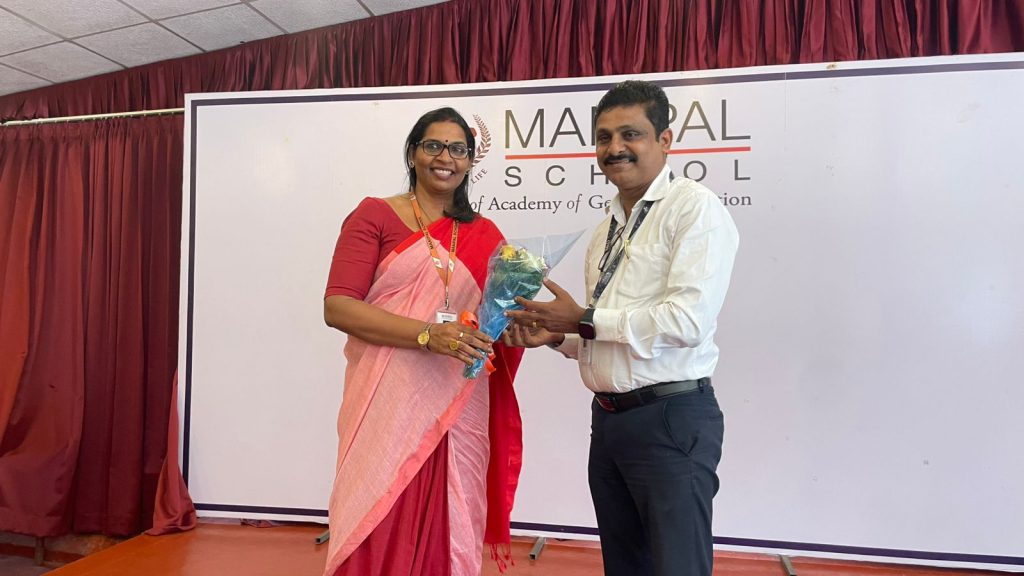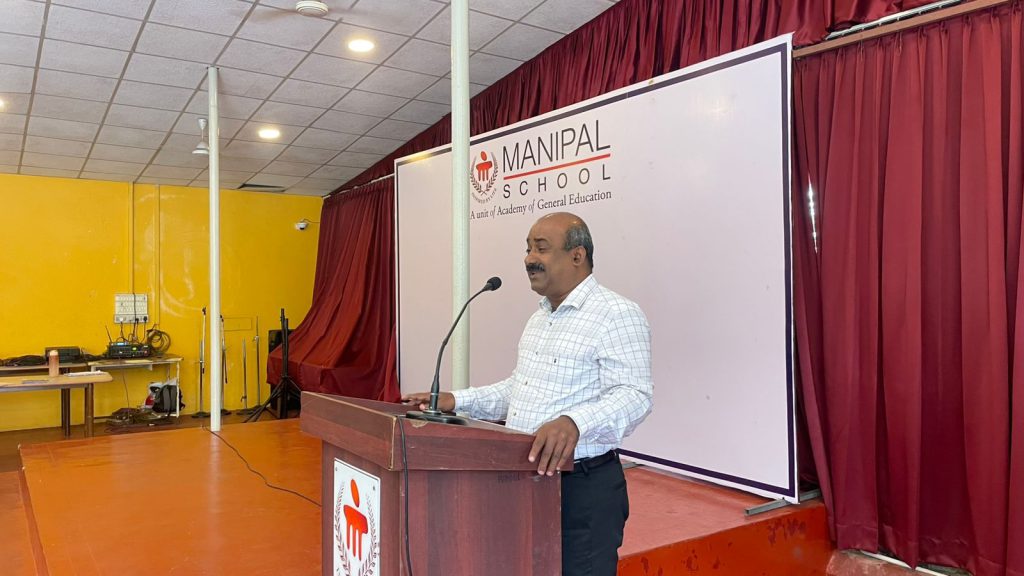The Art of Producing a Campus Newspaper: A Path to Excellence | Global TV
M.J .Mathew, Manager, The Hindu Group +91 99807 71213 |
NV Paulose, Chairman, Global TV +91 98441 82044

A brilliant idea of preparing a full-fledged newspaper by students is initiated by Mrs. Srilatha S. Alva, Principal of Manipal School, Mangalore. This will be made possible with the participation of faculty and support of reputed media houses and likeminded people. The idea was inspired by The Hindu Newspaper and Hindu in Schools Initiative. This is a model others can also follow. Congratulations to those who are already doing it. Take it to next level step by step.
The journey of creating a campus newspaper is both exciting and challenging. It requires a combination of teamwork, creativity, and dedication. Manipal school organised an interactive session on the topic recently in the school.

M.J .Mathew, Manager, The Hindu Group and NV Paulose, Chairman, Global TV were the resource persons. The session was interactive and the participants shared invaluable insights into what it takes to establish a thriving campus newspaper and how it can transform students into effective communicators and creators; both writers and editors.
A Lesson from Nature: The Beehive Approach
Bees produce honey through a complex process. Worker bees collect nectar from flowers and store it in their honey stomachs (a special organ separate from their digestive system). Once back at the hive, they pass the nectar to other worker bees through regurgitation. This process happen multiple times.
The bees then deposit the nectar into honeycomb cells, where it is fanned by their wings to evaporate water content and thicken it. The nectar is then enzymatically transformed into honey during this process. Finally, the cells are sealed with wax to preserve the honey. This is to give an overall idea about a process.
Similarly, creation of a campus newspaper demands that everyone involved and has a clearly defined, time-bound task. From writers to editors, designers to managers, each person contributes to the end product. A collective and efficient effort ensures that tasks are completed on time with growth and innovation.
From Driving to Writing: Building Skills with Focus

Learning to write is akin to learning to drive. At first, the process may seem disheartening, but with concentration and consistent practice, it becomes second nature. Concentration is the cornerstone of mastering any skill, and the mentors emphasized the importance of building and measuring it. Developing writing skills requires focus, discipline, and the courage to start.
Like a skilled driver drive a vehicle with ease, a good writer can convey thoughts effortlessly. Aspiring student writers should embrace the learning curve and strive to create content that connects with readers. Write what is right.
Appreciation: The Secret Ingredient for Motivation

Recognition is a powerful motivator. When students receive genuine appreciation for their work, they become more committed and dedicated. Freedom to work is also very important. A shared story about a Labrador dog highlighted this idea.
The dog, initially reluctant to consume ghee, eagerly licked it off the floor when left to its own choices. What made the dog to become reluctant first? Its hands and legs were forcefully tied up by 2 people and the neck was kept under armpit of the first person. It was a very disturbing scenario created for the dog for making it to drink what it would have drank happily without all these steps.
The lesson? Students thrive when they are encouraged and given opportunities to shine on their own efforts. Can teachers and mentors make it a habit to appreciate students for their hard work, however small they are? Positive reinforcement can always foster creativity, dedication, and teamwork. It is the most essential part or ingredient to make a successful campus newspaper. Set clear target, nurture team work, share responsibilities. Rest everything will fall in place by default.
The Role of Editors: Elevating Content with Care
Editors play a crucial role in refining and elevating the written content. Their job isn’t merely to criticize or correct but to enhance the little writer’s message while maintaining its original intent. The editorial process involves careful selection, improvement, and skilful presentation, ensuring that the content is both impactful and beneficial for readers. See what the readers would like to see.
Creating a campus newspaper requires two key teams:
- The Writing Team:
Focused on generating content, including articles, interviews, and creative pieces.
- The Editorial Team:
Tasked with reviewing, improving, and polishing the content for publication.
Both teams must collaborate closely with each other to produce a newspaper that reflects the ethos, values and aspirations of the campus.
A Call for Excellence: Trustworthy Media

In today’s digital age, social media often misguide and confuse us with unreliable and misleading information. To counter this trend, students must learn to produce content that is worth reading, trustworthy, well-researched, and meaningful. A campus newspaper offers the perfect platform to cultivate these skills.
Students should take inspiration from reputable print media outlets that uphold journalistic integrity. A well-crafted newspaper, like The Hindu, always undergo multiple layers of scrutiny to ensure accuracy and fairness. Emulating such tenets will help students develop responsible and ethical reporting habits.
Bringing the Vision to Life
The mentors concluded with a practical suggestion: start small but aim big. Begin with a four page newspaper or a magazine, and gradually evolve your dream into a full-fledged campus newspaper. With the right guidance from the faculty and professional support The Hindu and Global TV Writers’ Syndicate, students can create a publication that becomes a source of pride for the institution.
Producing a full-fledged newspaper is about writing, editing, designing, printing and celebrating; but it’s far beyond all these things. It is about building a culture of team work, collaboration, learning, theme setting and excellence.
By embracing these principles, your campus can establish an in-house newspaper that inspires, informs, and connects. Your campus profile transforms to next level once you start a full-fledged newspaper from the campus. You will experience a new class of readers waiting to read your newspaper on a regular basis.
Creating a Campus Newspaper: Thinking Big, Acting Smart

Producing an in-house newspaper is a significant initiative for any campus. It’s about compiling articles, fostering creativity, building teams, and presenting valuable content that can connect with potential readers.
Here’s a roadmap for students venturing into this rewarding project.
Choosing Your Focus
A newspaper serves diverse readers, but it’s crucial to identify what appeals most to your audience. As students, identify the sections you read regularly, those you glance at occasionally, and those you ignore. If a section fails to capture interest, consider writing to the editor with constructive feedback. This habit of critical engagement ensures that the newspaper remains relevant. Take lessons from the model newspaper will help you to make your in-house newspaper better.
Writing vs. Talking: A Unique Skill
Writing is a silent way of talking. It allows the writer to create vivid images in the minds of readers. For instance, if you describe a beautiful morning, the reader’s imagination conjures positivity and warmth. Writing requires practice and a mind-set of sharing ideas effectively. Unlike talking, writing stays and echoes long after its read. Think before You Act and you Progress faster.
Embracing Opportunities: A Lesson in Courage and Preparation
Life often presents us with fleeting opportunities. While some may hesitate or doubt their ability, the golden rule is clear: when an opportunity arises, seize it with both hands and all your mind. Whether it’s a chance to step on to the stage, share your thoughts, tackle a challenge, or take on something new, these moments offer invaluable opportunities for growth and impact. Utilize them.
This principle was brought to life during a school discussion about creating a front-page article for the upcoming school newspaper. Among the students brainstorming ideas, Fiza was called to the stage. She was taken back initially but stood up and came to the stage. She didn’t have a topic in mind but knew she wanted her article to claim the front page, that too the prime spot; the front page’s top section. This bold ambition set a challenge for herself: to create something extraordinary that would leave the readers with lasting impression.
The discussion raised an important question: Should the article focus on the past or the future? Students were called one after the other to the stage and a discussion was insightfully choreographed live on the stage. One girl was reluctant to get up and come on to the stage. When the speaker insisted her to come up and she was hesitant, her teacher stepped in between. She called her to her side, embraced her and encouraged her to move on. The student got into the stage and engaged into a conversation with the people over there. The speaker told her the decision that she took to face the fear instantly had transformed her future. He also had the presence of mind to appreciate the teacher who had encouraged the student and to present her as a role model teacher. He said; the primary duty of a teacher is to handhold the students and to fill confidence and courage within them.
The Role of Preparation
This conversation underscored an essential truth: preparation is the foundation of success. It is not enough to merely show up; readiness ensures confidence and quality. Whether you’re writing an article, speaking publicly, or managing a task, your effort in preparation defines the outcome. Preparedness allows you to engage meaningfully, contribute effectively, and add value to any endeavour.
The Courage to Step Forward
Imagine standing in front of an audience, even when you are not sure about what you will be able to speak. The courage to step forward, despite the fear of failure, is what sets achievers apart. It’s not about being perfect but about showing up and giving your best. Each experience is important, no matter how nerve-wracking, or breathe taking. All of them build confidence and expand your potential.
This is a valuable lesson for all of you students and for anyone around. Success rarely comes from waiting for perfect conditions; it stems from making the most of the opportunities we encounter. Taking initiative, even when the path is unclear, is often the spark that ignites significant achievements.
A Call to Action
The next time an opportunity presents itself; whether in school, work, or life; take it up. Take a leap, prepare with dedication, and embrace the challenge heartily. Whether writing a front-page article, presenting an idea, or leading a project, remember that the process of stepping up is just as important as the result.
Let courage and preparation guide you to turn moments into milestones.





